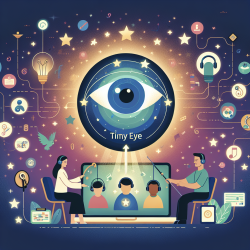Understanding the Impact of LRRC7 Variants
Recent research has uncovered significant insights into the genetic underpinnings of intellectual disabilities and autism, focusing on variants in the LRRC7 gene. This gene encodes Densin-180, a protein crucial for synaptic function in neurons. The study, "Variants in LRRC7 lead to intellectual disability, autism, aggression and abnormal eating behaviors," identifies 33 individuals with a dominant neurodevelopmental disorder linked to heterozygous missense or loss-of-function variants in LRRC7.
Key Findings and Their Implications
The research highlights a spectrum of clinical features associated with LRRC7 variants, including intellectual disability, autism, ADHD, aggression, and hyperphagia-associated obesity. The study provides compelling evidence that these variants disrupt normal synaptic function, which could be a major determinant of intellectual development and behavior.
For practitioners, these findings underscore the importance of genetic testing in diagnosing neurodevelopmental disorders. Understanding the genetic basis can guide more personalized intervention strategies, potentially improving outcomes for affected children.
Applying Research to Practice
As a practitioner, integrating these insights into your practice involves a few key steps:
- Stay Informed: Keep up-to-date with the latest research on genetic influences in neurodevelopmental disorders. This knowledge can enhance your diagnostic capabilities and intervention planning.
- Collaborate with Geneticists: Work closely with geneticists to interpret genetic testing results. This collaboration can provide a comprehensive understanding of each child's unique needs.
- Customize Interventions: Use genetic information to tailor interventions. For example, understanding a child's specific genetic profile can help in designing targeted speech and language therapies.
- Advocate for Genetic Testing: Encourage families to consider genetic testing when appropriate, as it can provide valuable insights into their child's condition and guide treatment decisions.
Encouraging Further Research
While the current study provides significant insights, it also opens avenues for further research. Understanding the full spectrum of LRRC7's role in neurodevelopment requires ongoing investigation. Practitioners can contribute to this field by participating in research studies, sharing clinical observations, and collaborating with research institutions.
For those interested in delving deeper into the research, the original paper provides a comprehensive analysis of the findings and methodologies. To read the original research paper, please follow this link: Variants in LRRC7 lead to intellectual disability, autism, aggression and abnormal eating behaviors.










